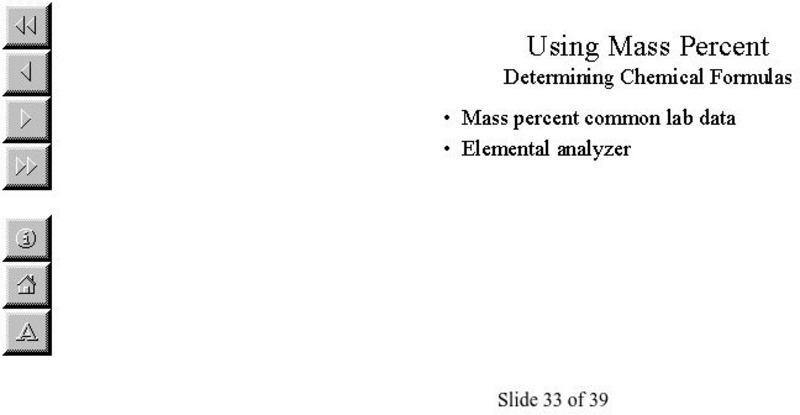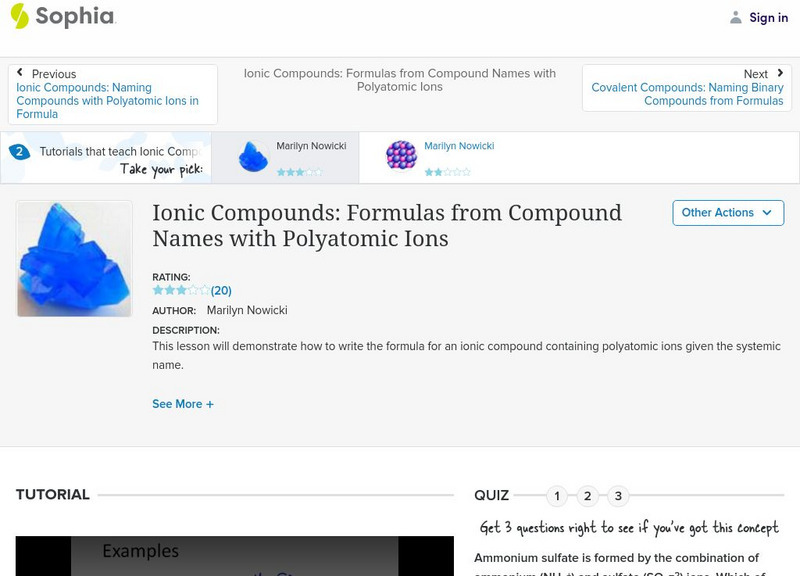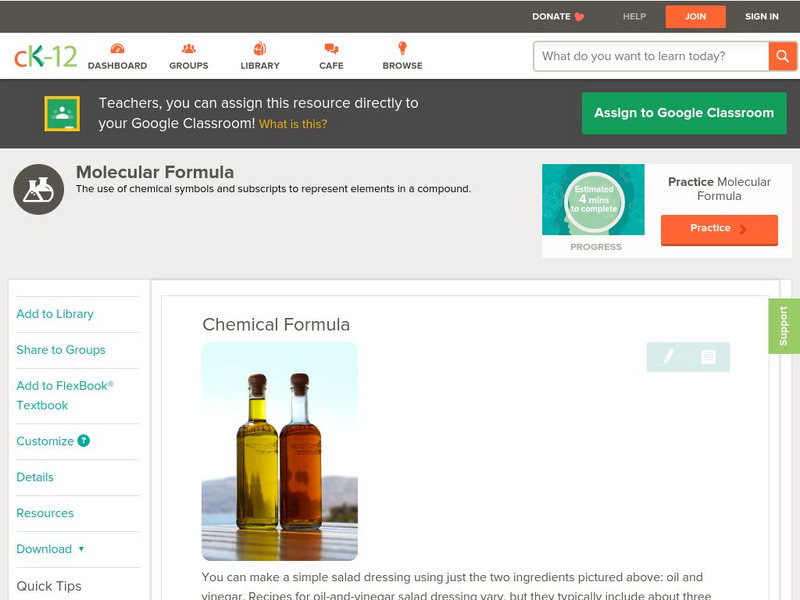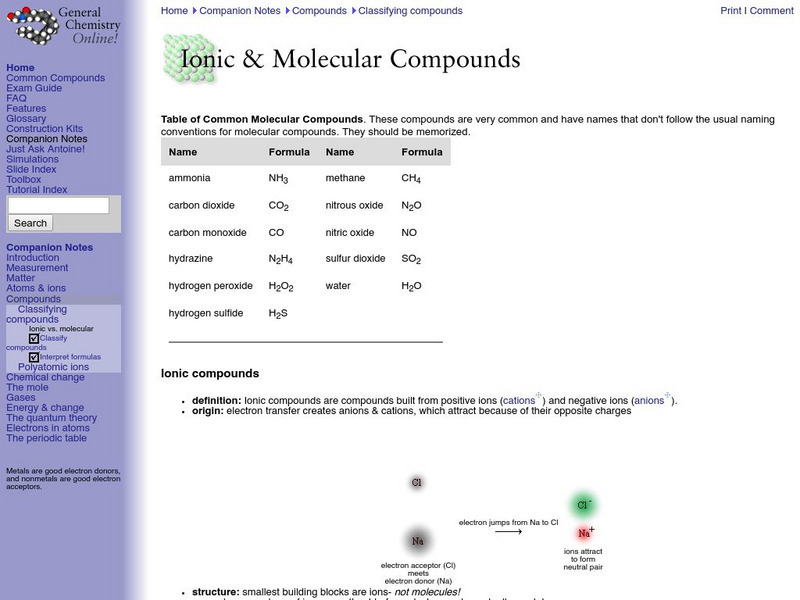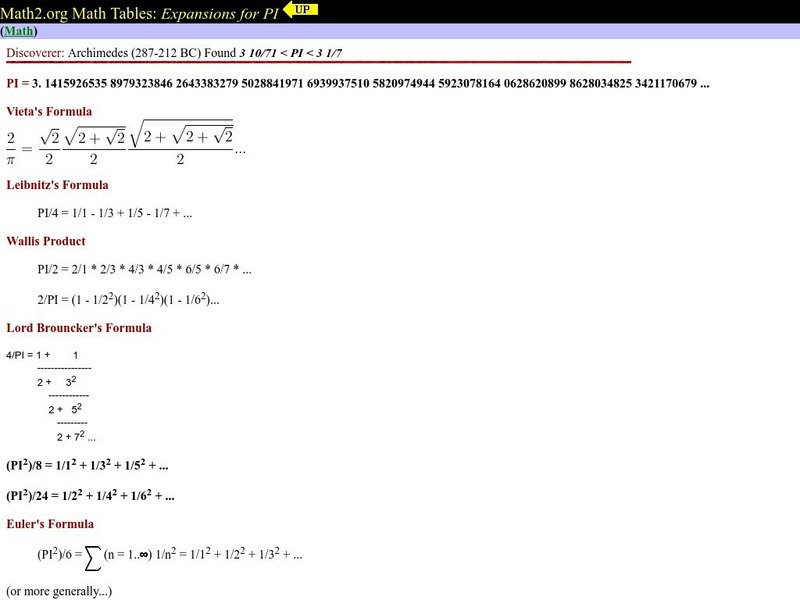Other
Seton Hall University: Using Mass Percent
Slides in presentation show how to use mass percent to calculate empirical and molecular formulas.
Other
Cpa class.com: Ratios for Financial Statement Analysis
This site summarizes the most common financial statement analysis ratios and shows the formulas for calculating them. Click on "Annual Report Project" for additional related links.
Other
Aromatherapy
Aromatherapy is the use of natural and high quality plant essential oils to enhance the health of body and mind, and to treat disorders.
Other
Fernbank: Naming Chemical Compounds
Learn how to name chemical compounds. Scientist world over use a standard method for naming chemical compounds based on an international standard that makes working with chemicals not only precise but safe as well. Includes quiz.
PBS
Pbs: Interactive Poetry
What is interactive poetry? Use this website to learn more about this form of poetry.
University of Nebraska
University of Nebraska: Determining a Molecular Formula
This is a seven part site from the University of Nebraska on molecular formulas. Sections are: Introduction, Purpose, General Safety Considerations, Procedure, Data Analysis and Concept Development, Implications and Applications,...
Clackamas Community College
Clackamas Community College: Molecular Formulas
Discussion of molecular formula and how to determine it from empirical formula. Practice problems are available.
Clackamas Community College
Clackamas Community College: Empirical Formulas
This site presents as explanation for calculating empirical formulas from composition data. Numerous examples are given, along with practice problems.
Sophia Learning
Sophia: Ionic Compounds: Formulas From Compound Names With Polyatomic Ions
This lesson will demonstrate how to write the formula for an ionic compound containing polyatomic ions given the systemic name.
Sophia Learning
Sophia: Ionic Compounds: Naming Compounds With Polyatomic Ions: Lesson 1
This lesson will provide naming rules for ionic compounds containing polyatomic ions and give examples. It is 1 of 2 in the series titled "Ionic Compounds: Naming Compounds with Polyatomic Ions in Formula."
Mangahigh
Mangahigh: Algebra: Form an Expression or Formula
Students watch an online tutorial on the concept of writing expressions. After watching, students test their knowledge by attempting ten practice problems that increase or decrease in difficulty based on their answers.
CK-12 Foundation
Ck 12: Geometry: Perimeter of Squares and Rectangles
[Free Registration/Login may be required to access all resource tools.] Find the perimeter of squares and rectangles.
CK-12 Foundation
Ck 12: Chemistry: Formulas for Binary Ionic Compounds
[Free Registration/Login may be required to access all resource tools.] Covers formulas for binary ionic compounds.
CK-12 Foundation
Ck 12: Physical Science: Chemical Formula
[Free Registration/Login may be required to access all resource tools.] How to write chemical formulae and what they represent about the substance.
Sophia Learning
Sophia: Converting From Mass to Particles Using a Balanced Chemical Equation
A narrated screencast explaining how to use a balanced chemical equation to determine the number of particles of a substance given the starting mass of another substance. [4:46]
Other
Vlps: Mean and Standard Deviation
Explanation of frequency distributions, mean, standard deviations, and variance including a Java Applet.
Oswego City School District
Regents Exam Prep Center: Area of Polygons and Circles
How would you find the area of a polygon or circle? Explore this concept with engaging activities at this test prep site. Here you will find detailed problem solving strategies with accompanying visuals, a reference table with formulas,...
Frostburg State University
General Chemistry Online: Ionic and Molecular Compounds
Provides a good outline of the concepts involved in ionic and covalent bonding, with links to definition of terms. Features a list of common molecular compounds and a chart that compares ionic and molecular compounds.
US Food and Drug Administration
U.s. Food and Drug Administration: Aromatherapy
This government agency article states its view of aromatherapy and the claims of its effectiveness in promoting health.
Better Lesson
Better Lesson: Finding the Area Review and Assessment
Sixth graders find the area of rectangles, triangles, parallelograms, and trapezoids by using formulas or by composing into rectangles or triangles.
Purple Math
Purplemath: Trigonometric Identities
Lists the basic trigonometric identities, and specifies the set of trig identities to keep track of, as being the most useful ones for calculus.
Math2
Math2.org: Expansions for Pi
A listing of some of the more famous formulas developed and used throughout the centuries for defining pi are given and explained.
Math Medics
S.o.s. Math: The Quartic Formula
This lesson provides information on the quartic formula. Examples are provided with answers.
Other
World Wide Metric Calculator
Do you need a quick conversion from metric units to imperial units or just the reverse? Use this resource for conversions of length, weight, pressure, and volume.


